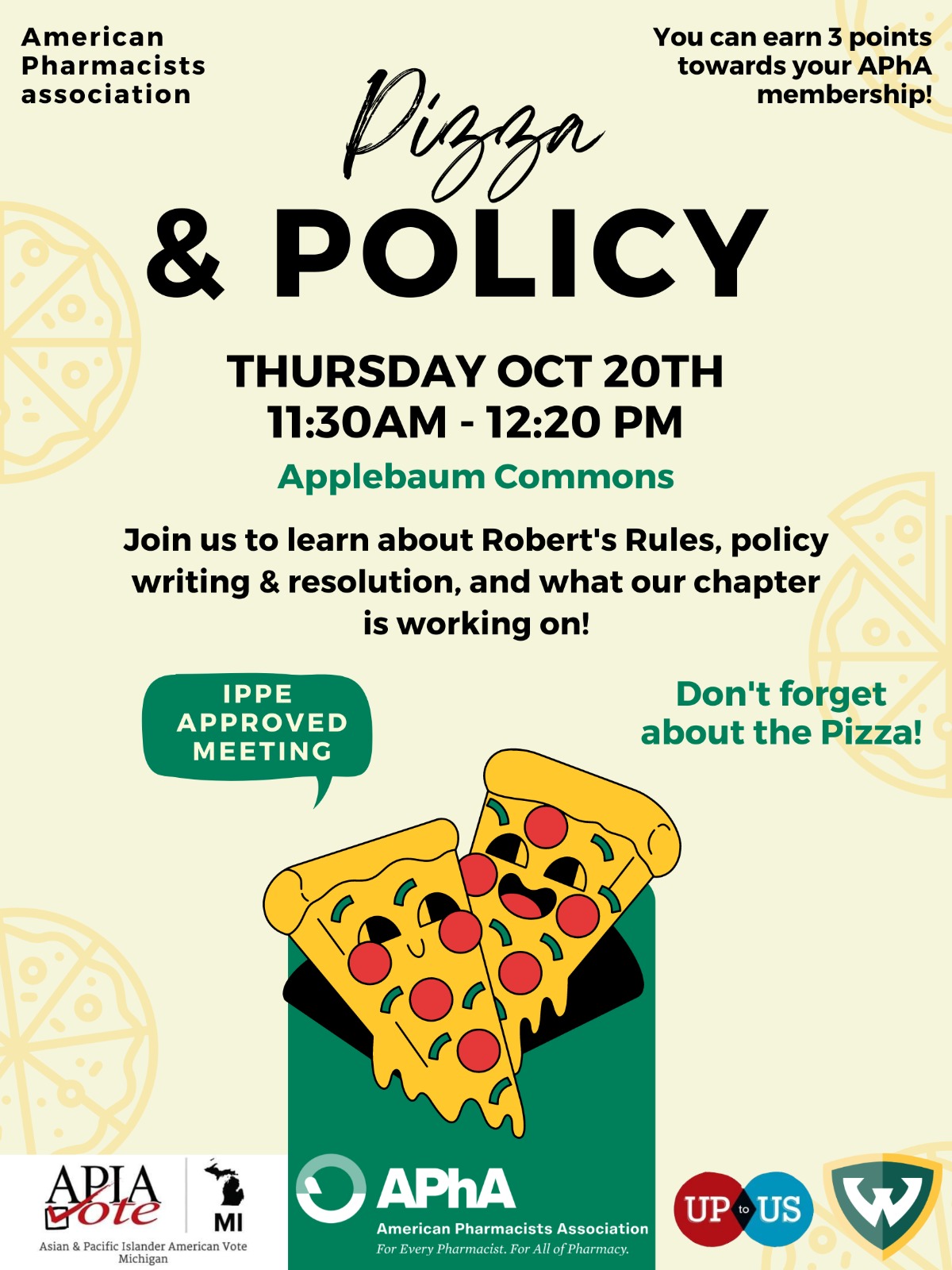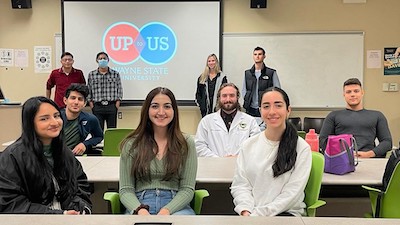It’s Up to Us: Students are invited to attend APhA-ASP Pizza & Policy event on Oct. 20
Submitted by WSU Up to Us team
One of the most important ways to advocate for pharmacy is by regularly contacting elected officials and educating them on issues that are important to health care and which impact daily pharmacy practice. This advocacy helps establish guidelines and laws that benefit health care organizations, our health care systems and the general well-being of our citizens. Wayne State student pharmacists are working to educate their peers on the power of policy and how to reduce barriers, create opportunities, and provide incentives that influence the choices and laws that impact health.
The WSU chapter of the American Pharmacy Association Academy of Student Pharmacists (APhA-ASP) together with Up to Us and APIA-Vote MI invite students to attend the Pizza & Policy event on Thursday, Oct. 20. This IPPE-approved meeting will take place in the Applebaum Building Commons during organization hour from 11:30 a.m.-12:30 p.m. Attendees will learn about drafting policy, the current policies APhA-ASP are reviewing, and how to reach out to legislators to advocate for the pharmacy profession and better health care outcomes. Pizza will be served and attendees will be able to register to vote for the upcoming midterm elections.
Students Collaborating on Policy and Advocacy (SCOPA) Chairman Thomas Whaley has represented Wayne State University in SCOPA for more than two years and has drafted multiple policies presented to his pharmacy peers.

“Pharmacy students should be involved in policy not only to stay informed on the ever-changing profession but also to help serve their communities better. We should all strive to advocate wherever possible so that pharmacy remains a great place to practice,” said Whaley.
“One of the best ways to advocate for our profession is to learn about policy development. Attending Thursday’s event will provide students with a good background on its importance,” added APhA-ASP Policy Vice President Mirna Eshaya, who is responsible for increasing awareness of issues affecting pharmacy practice and educating students on health care-related legislation. “We are working on policies to guide legislators and ultimately want these resolutions to pass. In order for that to happen, voting is a must. We do not want all these efforts to go to waste. Practicing your civic duty is essential to progressing the professional pharmacy. For any student who has not yet registered to vote, APIA-Vote MI will have a table at our event to help them participate in the November elections.”
The WSU Up to Us team is also helping organize this event and will be on hand to educate participants on the impact of health care spending on the U.S. economy. They will also be facilitating a letter-writing workshop, with the goal of advocating Congress to prioritize policies that can improve better health care outcomes for the American people.

“The U.S. national debt is over $31 trillion and health care spending accounts for more than one-fifth of the economy. Per capita healthcare spending is nearly three times that of other developed nations yet American healthcare outcomes are generally no better than our peer, if not worse,” said Up to Us team member Joseph Paul Javier. “Proper fiscal policy and legislation that affects the health of our citizens should address the iniquities and inefficiencies that plague the American health care system.”
APhA-ASP President Shannon Habba added, “Pharmacists and student pharmacists alike should be involved in policy-making, as is it a powerful tool to advance our profession and broaden the scope of pharmacy practice. We need to help guide policy to encompass our full capabilities as health care providers and it begins with getting involved in this legislative process, promoting policies that fulfill these goals, and voting for legislators that will support these efforts.”
About us
The Doctor of Pharmacy program at Wayne State University is a four-year curriculum in the heart of Detroit. Approximately 100 students are enrolled in each year of the program. WSU Applebaum information meetings for prospective students take place at 6 p.m. on the first Tuesday of each month. The application process for the Doctor of Pharmacy program begins each July.
An anchor in urban health care
The Eugene Applebaum College of Pharmacy and Health Sciences is built on more than 100 years of tradition and innovation in the heart of Detroit. We have grown deep roots in our city, harnessing its powerhouse hospital systems and community service organizations as vibrant, real-world training grounds for students, with an ongoing focus on social justice in health care. And our research at all levels – from undergraduates to veteran faculty members – translates into creative solutions for healthier communities.
Wayne State University is a premier urban research institution offering approximately 350 academic programs through 13 schools and colleges to more than 25,000 students.

